Politics
Trump to host his first summit with Central Asian leaders
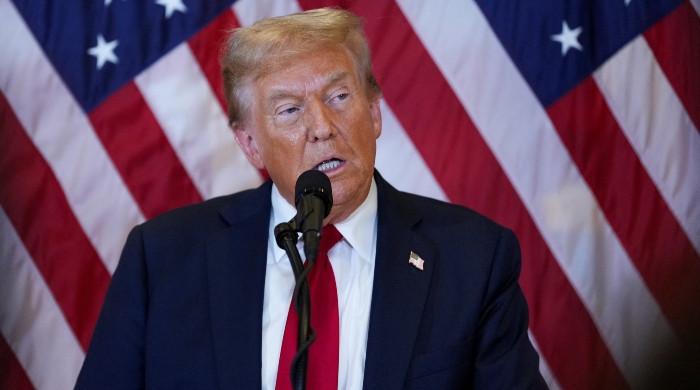
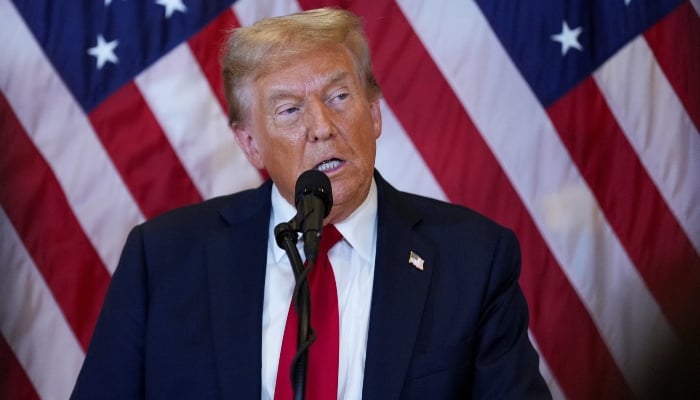
ALMATY: US President Donald Trump will host all five Central Asian leaders in Washington on Thursday for the first time, a few months after they held separate summits with Russia’s Vladimir Putin and China’s Xi Jinping.
The West has upped its interest with the resource-rich region, where Moscow’s traditional influence has been questioned since the Kremlin’s Ukraine invasion and where China is also a major player.
Race for influence
Since the Ukraine war, the leaders of Kazakhstan, Kyrgyzstan, Tajikistan, Turkmenistan and Uzbekistan have stepped up contacts with other countries in the so-called “C5+1” format.
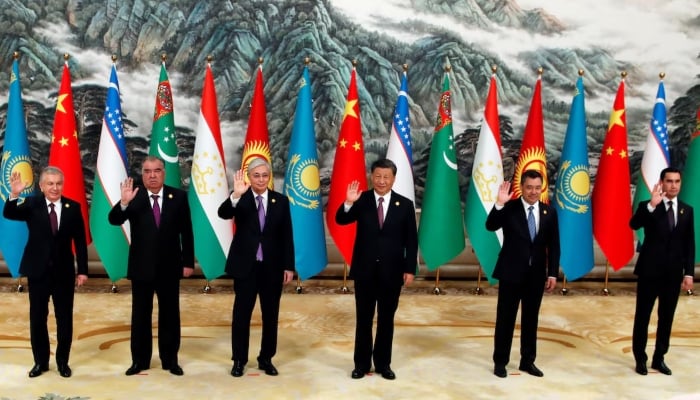
Washington and the European Union have intensified their diplomacy with the landlocked countries that gained independence from the Soviet Union in 1991, with a first US-Central Asia summit in 2023.
Russia, China, the West and Turkiye have all competed for influence in the resource-rich region.
This year, EU chief Ursula von der Leyen, Russian President Vladimir Putin and China’s leader Xi Jinping have all visited the region for summits with the five Central Asian leaders.
At the same time, ending most regional conflicts has enabled Central Asian countries to put on a united front in diplomacy.
China — which shares borders with Kazakhstan, Kyrgyzstan and Tajikistan — has presented itself as a main commercial partner, investing in huge infrastructure projects.
The ex-Soviet republics still see Moscow as a strategic partner but have been spooked by Russia’s invasion of neighbouring Ukraine.
Turkey has built on its cultural ties with Central Asia and taken advantage of a distracted Russia to boost military and trade ties.
The West established some ties with the region in the early 2000s, when Western troops used bases in Central Asia during Afghanistan campaigns.
Resource-rich region
The United States and European Union are drawn by the region’s huge — but still mostly unexploited — natural resources as they try to diversify their rare earths supplies and reduce dependence on Beijing.
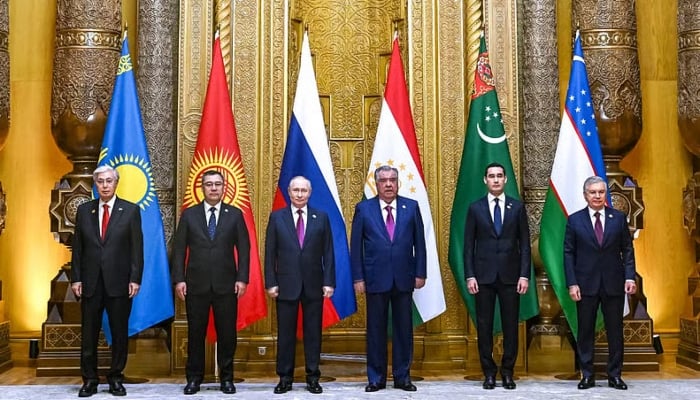
Other than rare earths, Kazakhstan is the world’s largest uranium producer, Uzbekistan has giant gold reserves and Turkmenistan is rich in gas. Mountainous Kyrgyzstan and Tajikistan are also opening up new mineral deposits.
Russia remains firmly established in the region’s energy sector, supplying hydrocarbons through Soviet-era infrastructure and building nuclear plants.
Central Asia is also one of the world’s most polluted regions and hardest hit by climate change. All five countries have struggled with a shortage of water.
Complicated logistics
But exploiting these giant reserves remains complicated in the impoverished states with harsh and remote terrains.
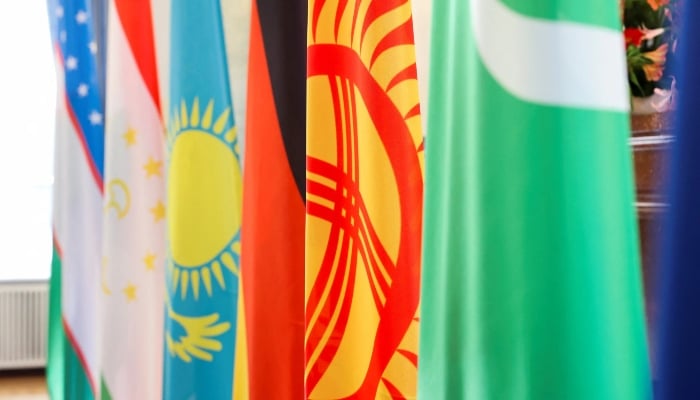
Almost as large as the EU, but home to only about 75 million, Central Asia is landlocked and covered by deserts and mountains. It is sandwiched between countries that have strained ties with the West: Russia to the north, China to the east and Iran and Afghanistan to the south.
But, on the Silk Road for centuries, it is attempting to revive its historic role as a trading hub.
The five Central Asian states have forged several partnerships to break free from their dependence on Moscow.
Both Beijing and Brussels support the development of a transport route across the Caspian Sea that allows reaching Central Asia from Europe through the Caucasus, bypassing Russia.
Between 2021, shortly before Russia’s Ukraine invasion, and 2024, the transport of goods by this road saw a 660% increase, official statistics show.
Muffled human rights
For Trump, who has expressed admiration for hardline regimes, economic cooperation with Central Asia has taken first place over promoting democratic values in the authoritarian countries.
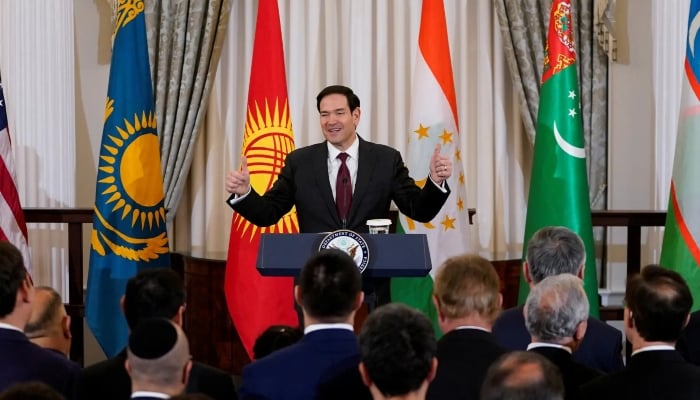
While the region has opened up to tourism and foreign investment, rights groups have sounded the alarm over the further deterioration of civil freedoms.
Human Rights Watch has called on the United States to “ensure human rights are a key part of the agenda” during the summit.
“The summit is taking place while all participating governments have increased efforts to stifle dissent, silence the media, and retaliate against critics at home and abroad,” it said in a statement Monday.
Central Asian countries are ranked at the bottom of the Reporters Without Borders press freedom ranking, with Turkmenistan — one of the world’s most secretive states — ranked 174th out of 180 countries.
Kazakhstan and Kyrgyzstan had welcomed Trump’s order to dismantle US media outlet Radio Free Europe — one of the last sources of alternative information in Central Asia.
Politics
Groping of Mexico’s president puts violence against women in spotlight
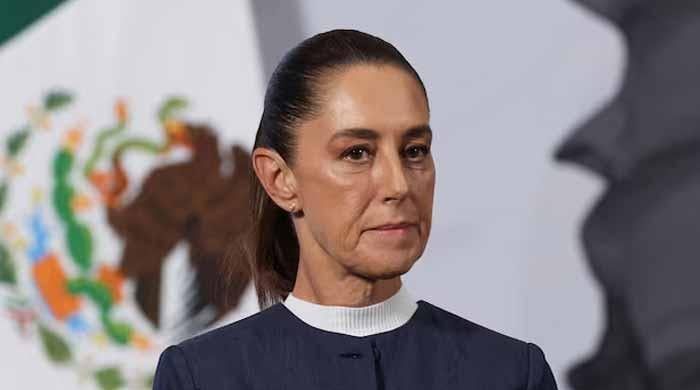
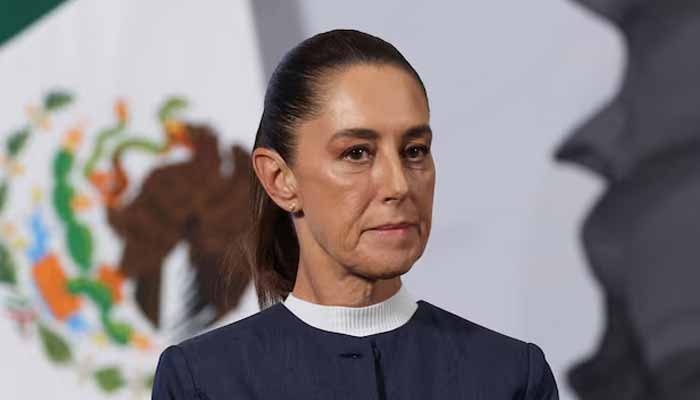
- Assault took place on short walk between meetings.
- President files complaint against man who groped her.
- Incident underscores violence women face daily.
Mexican President Claudia Sheinbaum said on Wednesday she filed a complaint against a man who groped her and tried to kiss her as she walked between meetings in the capital city, a day after a video of the incident went viral.
“If this happens to the president, where does that leave all the young women in our country?” said Sheinbaum, Mexico’s first female president. “No man has the right to abuse women’s personal space.”
Video of the incident quickly ricocheted across the internet before being taken down by some accounts, underscoring for many in Mexico the insecurity women face in a country steeped in machismo and gender-based violence.
It has also raised questions about Sheinbaum’s security detail. Like her predecessor, Andres Manuel Lopez Obrador, Sheinbaum travels with minimal security and makes herself widely available to the public, including wading into crowds of people.
She said on Wednesday that she did not plan to change that practice, saying, “we have to be close to the people.”
The incident happened on Tuesday in the capital’s historic centre as Sheinbaum was greeting members of the public while making the short walk from Mexico’s national palace to the Ministry of Education.
The video shows a middle-aged man putting his arm around Sheinbaum, touching her chest and attempting to kiss her. She moves his hands away before a member of her staff steps between them. The president’s security detail did not appear to be near her in the moment.
Sheinbaum said the man appeared to be drunk.
Re-Victimisation
She also blasted Mexican newspaper Reforma for publishing images of the man groping her, saying she considered it a “re-victimisation” and that it crossed an ethical line.
“The use of the image is also a crime,” Sheinbaum said, pointing to legislation against digital violence. “I am waiting for an apology from the newspaper.”
The federal government’s Women’s Ministry, created under Sheinbaum, issued a statement on Tuesday encouraging women to report violence against them, but asking media outlets “not to reproduce content that violates the integrity of women.”
Still, feminist activists have sharply criticised Sheinbaum in the past for not doing enough to address violence against women. Among other things, they point to lacklustre prosecutions and investigations of femicides – the killing of a woman because of her gender.
In 2024, Mexico recorded 821 femicides, according to government data. There have been 501 femicides recorded through September of this year, and many advocates say the numbers are likely far underestimated.
Criminalising harassment
Ana Yeli Perez of the National Citizen Observatory on Femicide said the groping of Sheinbaum puts the issue of violence against women on the national agenda again.
“It’s reprehensible, it must be denounced, it must be named, because it’s an act of violence, but it’s also a significant event and symbolic of what women experience every day,” she said.
Sheinbaum said sexual harassment should be a “criminal offence, punishable by law,” adding that she has asked Mexico’s Women’s Ministry to conduct a review of the legal codes in each state.
Sexual harassment is a crime in about half of Mexican states, as well as the capital, Mexico City.
Local media identified the man who assaulted Sheinbaum as Uriel Rivera and a state security filing showed he was arrested at 9 pm on Tuesday night.
Politics
India’s Modi faces bellwether poll in poorest state
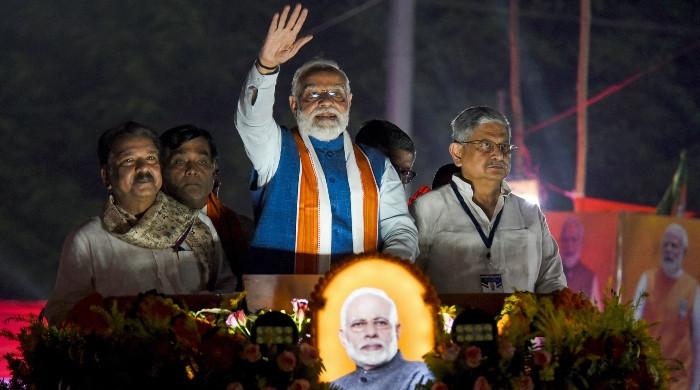
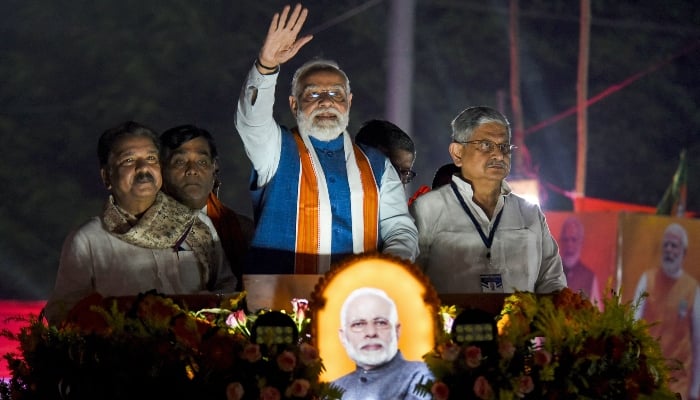
- Bihar votes in two phases, on November 6 and 11.
- Results due November 14, say election authorities.
- Money worries dominate for Bihar’s 130 million residents.
PATNA: Voting has started in Bihar, India’s poorest state, and for many of its 130 million people, one issue overshadows all others: money.
That’s what Prime Minister Narendra Modi’s Bharatiya Janata Party (BJP) hopes to capitalise on, wooing voters with economic incentives in a bid to win full control.
A win here, strategists say, could “energise” the BJP’s prospects in other key states heading into next year’s elections.
Hindu-majority Bihar, the country’s third most populous state — roughly equal to Mexico — is a bellwether battleground.
It remains the only state in the Hindi-speaking north where Modi’s Hindu nationalist party has never ruled alone.
For housewife Rajkumari Devi, feeding her three children depends on the daily wage her husband earns as a labourer in the Muzaffarpur district.
He takes home about 400 to 500 Indian rupees (around $5) on the days he does find work.
“There is no stability,” said the 28-year-old, outside her modest one-room home overlooking agricultural land.
“There have been times when he has not had work for days — so we stretch the little money we have,” she added. “There is unemployment everywhere.”
Bihar ranks worst in India on poverty indicators, according to the government’s NITI Aayog policy think tank, with a GDP per capita of INR52,379, just ahead of a country like the Central African Republic.
Cash promises
But it has made progress over the past decade.
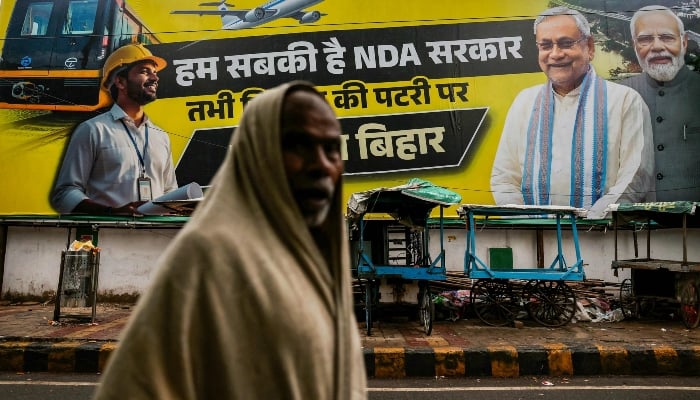
The share of citizens living in “multidimensional poverty” — deprived in health, education and living standards — fell from just over a half in 2016, to about a third in 2021, according to the latest data released last year.
In September, Modi announced investment projects worth $8 billion, including rail and road upgrades, new agricultural schemes and an airport terminal.
He also unveiled an $844 million initiative to support women entrepreneurs, offering 7.5 million women cash transfers of INR10,000 each.
The BJP, allied with Chief Minister Nitish Kumar’s Janata Dal (United) in the ruling National Democratic Alliance (NDA), faces a stiff challenge from the opposition.
At a rally in the state capital Patna on Sunday, Modi urged voters to “bless the NDA”.
A BJP victory in Bihar could, analysts say, boost its momentum in opposition-held states, such as neighbouring West Bengal, as well as Tamil Nadu in the south.
“This is the election which will decide whether the BJP can form a government on its own,” said Pushpendra, a political analyst who uses only one name.
A BJP win could “energise” the party elsewhere, he said.
The election will be held in two phases, on November 6 and 11. Results are due on November 14.
‘Jobless people’
The BJP’s main rival is an opposition alliance led by the Rashtriya Janata Dal (RJD) and the Congress party.
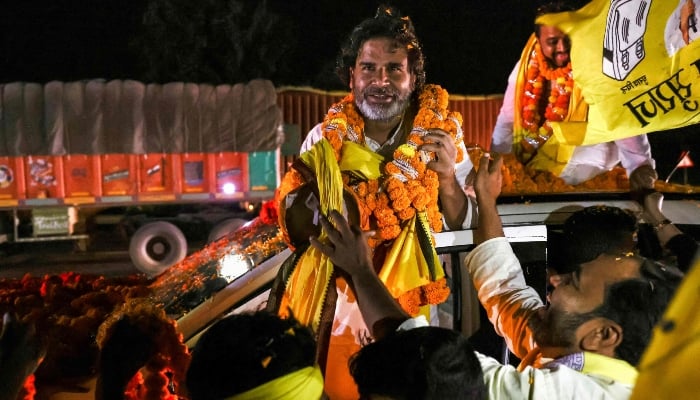
“Time to build new Bihar,” RJD leader Tejashwi Yadav said last week, promising one government job per family, after touching down in a helicopter in Darbhanga district, where narrow lanes wind between mud and thatch-roof homes.
Former BJP poll strategist Prashant Kishor has launched a party, Jan Suraaj, or “People’s Good Governance”.
Supporters draped him in marigold garlands as he paraded through the crowd.
“You only run or walk after a fall,” said supporter Mudassir, a 25-year-old student who goes by one name. “It’s alright if he doesn’t win big this time.”
Pushpendra said that the result will hinge on which party voters believe will help their future, noting that to be “Bihari” has become a byword for “jobless people”.
Vikash Kumar, 30, left Bihar a decade ago seeking work in other states, but still struggles to earn a steady income.
“If companies could be established here, people here wouldn’t die of hunger,” the labourer said.
“They will earn money, sit at home, live comfortably, and eat their meals.”
Politics
Trump administration has revoked 80,000 non-immigrant visas, says US official
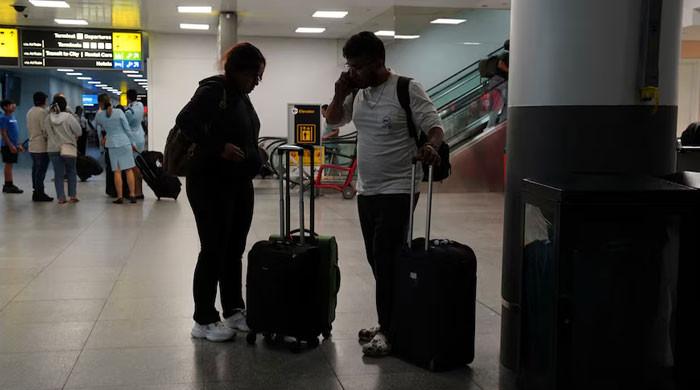
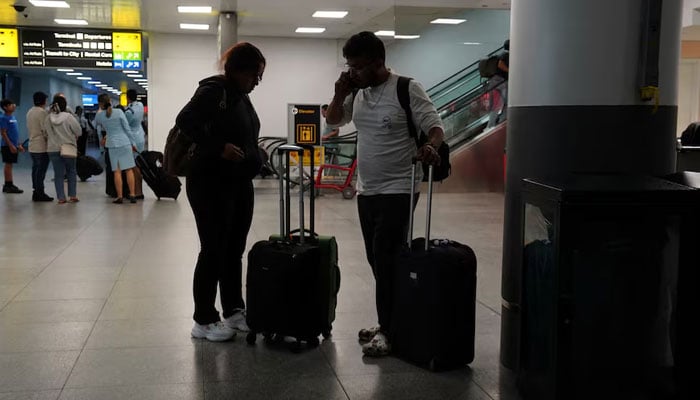
WASHINGTON: President Donald Trump’s administration has revoked around 80,000 non-immigrant visas since its inauguration on January 20 for offenses ranging from driving under the influence to assault and theft, a senior State Department official said on Wednesday.
The extent of the revocations, first reported by Washington Examiner, reflects a broad immigration crackdown initiated when Trump came into office, deporting an unprecedented number of migrants including some who held valid visas.
The administration has also adopted a stricter policy on granting visas, with tightened social media vetting and expanded screening.
Around 16,000 of the visa revocations were tied to cases of driving under the influence, while about 12,000 were for assault and another 8,000 for theft.
“These three crimes accounted for almost half of revocations this year,” said the senior State Department official, speaking on the condition of anonymity.
In August, a State Department spokesperson said Washington had revoked more than 6,000 student visas for overstays and breaking the law, including a small number for “support for terrorism.”
The department also said last month that it had revoked the visas of at least six people over social media comments about the assassination of conservative activist Charlie Kirk.
US Secretary of State Marco Rubio in May said he has revoked the visas of hundreds, perhaps thousands, of people, including students, because of involvement in activities that he said went against US foreign policy priorities.
Directives from the State Department this year have ordered US diplomats abroad to be vigilant against any applicants whom Washington may see as hostile to the United States and with a history of political activism.
Trump administration officials have said that student visa and green card holders are subject to deportation over their support for Palestinians and criticism of Israel’s conduct in the war in Gaza, calling their actions a threat to US foreign policy and accusing them of being pro-Hamas.
-

 Tech1 week ago
Tech1 week agoUS Ralph Lauren partners with Microsoft for AI shopping experience
-

 Tech1 week ago
Tech1 week agoOpenAI says a million ChatGPT users talk about suicide
-

 Tech1 week ago
Tech1 week agoHow digital technologies can support a circular economy
-

 Sports1 week ago
Sports1 week agoBilly Bob Thornton dishes on Cowboys owner Jerry Jones’ acting prowess after ‘Landman’ cameo
-

 Tech1 week ago
Tech1 week agoAI chatbots are becoming everyday tools for mundane tasks, use data shows
-

 Fashion1 week ago
Fashion1 week agoITMF elects new board at 2025 Yogyakarta conference
-

 Fashion1 week ago
Fashion1 week agoCalvin Klein launches Re-Calvin take-back programme across the US
-

 Business1 week ago
Business1 week agoTransfer test: Children from Belfast low income families to be given free tuition






